Sherlock, Sherlock Holmes
I have only ever read one of Arthur Conan Doyle’s Sherlock Holmes books – The Hound of the Baskervilles, a long long time ago. Before even thinking about reviewing stuff that has anything to do with Sherlock Holmes, I should probably read all the other books. But currently I’ve been stuck on one book for months because I’m so busy and the weather is too good to hide out in café’s in my lunch break (anything that doesn’t involve rain and temperatures below 5°C is too good). I’ll review this stuff anyway, maybe someone will feel inspired to watch it even though they might also not have read the books.
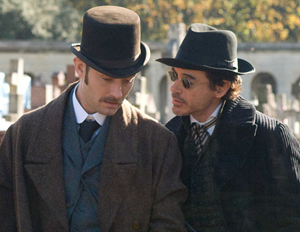 In February I saw Guy Ritchie’s Sherlock Holmes movie with Robert Downey Jr. and Jude Law in the lead roles. It’s, as far as I can interpret, a true to the source adaptation set in period England. Usually I don’t like Robert Downey Jr. that much and I don’t understand why they would cast an American in this oh-so-British role, but he did a remarkably good job as the brilliant, yet completely crazy detective. Guy Ritchie’s adaptation is witty, funny, entertaining and contains his trademark in your face fight scenes. A refreshing change is the film music in Sherlock Holmes, which is somewhat authentic to the period portrayed and not your average stereotypical action movie blowing horns-y music. The traditional folk music adds to the lively oddball characteristics of Mr. Holmes.
In February I saw Guy Ritchie’s Sherlock Holmes movie with Robert Downey Jr. and Jude Law in the lead roles. It’s, as far as I can interpret, a true to the source adaptation set in period England. Usually I don’t like Robert Downey Jr. that much and I don’t understand why they would cast an American in this oh-so-British role, but he did a remarkably good job as the brilliant, yet completely crazy detective. Guy Ritchie’s adaptation is witty, funny, entertaining and contains his trademark in your face fight scenes. A refreshing change is the film music in Sherlock Holmes, which is somewhat authentic to the period portrayed and not your average stereotypical action movie blowing horns-y music. The traditional folk music adds to the lively oddball characteristics of Mr. Holmes.
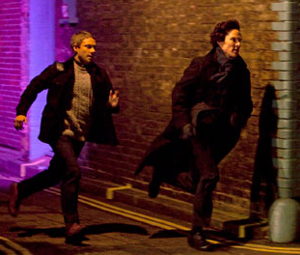 Quite recently, another great adaption of Arthur Conan Doyle’s consulting detective was aired by the BBC, entitled simply Sherlock. Written by Doctor Who head writer Steven Moffat and Doctor Who writer and actor of several episodes Mark Gatiss, this adaption is completely different from Guy Ritchie’s in that it is a modern adaption set in present-day London (and quite interestingly partly filmed in Cardiff, most notably the National Museum of Wales… which is used in every second Who episode). Present day technology plays a big part in Moffat’s and Gatiss’ vision and is seamlessly integrated into the true-to-the-book stories. Cell phones deliver important clues, and Dr. Watson has a blog as opposed to a diary.
Quite recently, another great adaption of Arthur Conan Doyle’s consulting detective was aired by the BBC, entitled simply Sherlock. Written by Doctor Who head writer Steven Moffat and Doctor Who writer and actor of several episodes Mark Gatiss, this adaption is completely different from Guy Ritchie’s in that it is a modern adaption set in present-day London (and quite interestingly partly filmed in Cardiff, most notably the National Museum of Wales… which is used in every second Who episode). Present day technology plays a big part in Moffat’s and Gatiss’ vision and is seamlessly integrated into the true-to-the-book stories. Cell phones deliver important clues, and Dr. Watson has a blog as opposed to a diary.
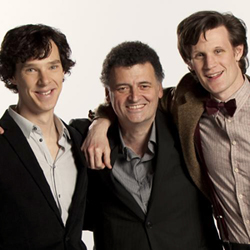 The BBC’s Sherlock was aired as a series of three 90-minute episodes, with each episode interpreting a classic Holmes case. The lead roles are played by Benedict Cumberpatch as Sherlock, who I have never heard of before but who does a brilliant job. Since the adaption is as true to the book as Guy Ritchie’s, there are of course similarities to Robert Downey Jr.’s Holmes. Optically he reminds me of Matt Smith’s Doctor, but I probably just think that because I associate him with Steven Moffat… and because Sherlock and John do a fair amount of running. Cumberpatch looks better, but goofy too. Dr. Watson is portrayed by Martin Freeman, who some might recognize as Arthur Dent from the recent adaption of A Hitchhiker’s Guide to the Galaxy. Both will be returning for a second season of Sherlock, a big relief for all of us who are still dazzled by that ending…
The BBC’s Sherlock was aired as a series of three 90-minute episodes, with each episode interpreting a classic Holmes case. The lead roles are played by Benedict Cumberpatch as Sherlock, who I have never heard of before but who does a brilliant job. Since the adaption is as true to the book as Guy Ritchie’s, there are of course similarities to Robert Downey Jr.’s Holmes. Optically he reminds me of Matt Smith’s Doctor, but I probably just think that because I associate him with Steven Moffat… and because Sherlock and John do a fair amount of running. Cumberpatch looks better, but goofy too. Dr. Watson is portrayed by Martin Freeman, who some might recognize as Arthur Dent from the recent adaption of A Hitchhiker’s Guide to the Galaxy. Both will be returning for a second season of Sherlock, a big relief for all of us who are still dazzled by that ending…
Aside from the obvious character similarities in Sherlock and Sherlock Holmes, the music in Sherlock seems to be somewhat inspired from Sherlock Holmes. You could probably argue for ages about who stole from whom, but these two adaptations just happened to have been in development side by side and released somewhat within in the same time frame. Both are brilliant and unique in their own way and both are equally worth watching.
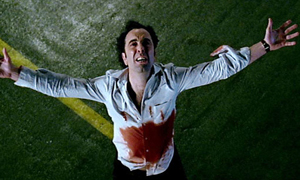 Steven Moffat has some previous experience in adapting classic stuff to present day. On of his previous projects was the BCC mini-series Jekyll which aired in 2007. It doesn’t use the exact characters with the exact names, but creates new characters with similar traits that seem to be related to the classic Dr. Jekyll (and Mr. Hyde). It’s quite clever and very creepy.
Steven Moffat has some previous experience in adapting classic stuff to present day. On of his previous projects was the BCC mini-series Jekyll which aired in 2007. It doesn’t use the exact characters with the exact names, but creates new characters with similar traits that seem to be related to the classic Dr. Jekyll (and Mr. Hyde). It’s quite clever and very creepy.
I wonder if Steven Moffat will continue to adapt stuff to the present, but since he’s quite busy with the Doctor, I doubt we’ll see something else anytime soon. I’d much prefer an encounter of the Doctor with a classic author, because those tend to be the most fun – as “The Unquiet Dead”, “The Shakespeare Code” or “The Unicorn and the Wasp” have proven.

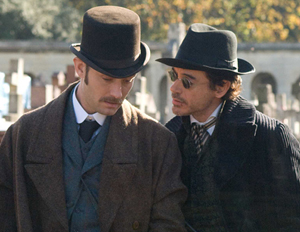
Moffat does indeed seem to have a knack for modernising old stuff. I read the first Sherlock story and there are a few bits that were incorporated nicely. For example Watson was a soldier in Afghanistan (different war though) and the meeting was exactly the same. Really great though was the finding of the body.
The Spoiler tag works with blockquote cite=”spoiler” – I’ll try to add that to the tag hints 😉
As I mentioned in the post I only read one of the books a long time ago, but while watching my boyfriend told me that a lot of the stuff is by the book. But I don’t know how long it’s been since HE read the books… 😉